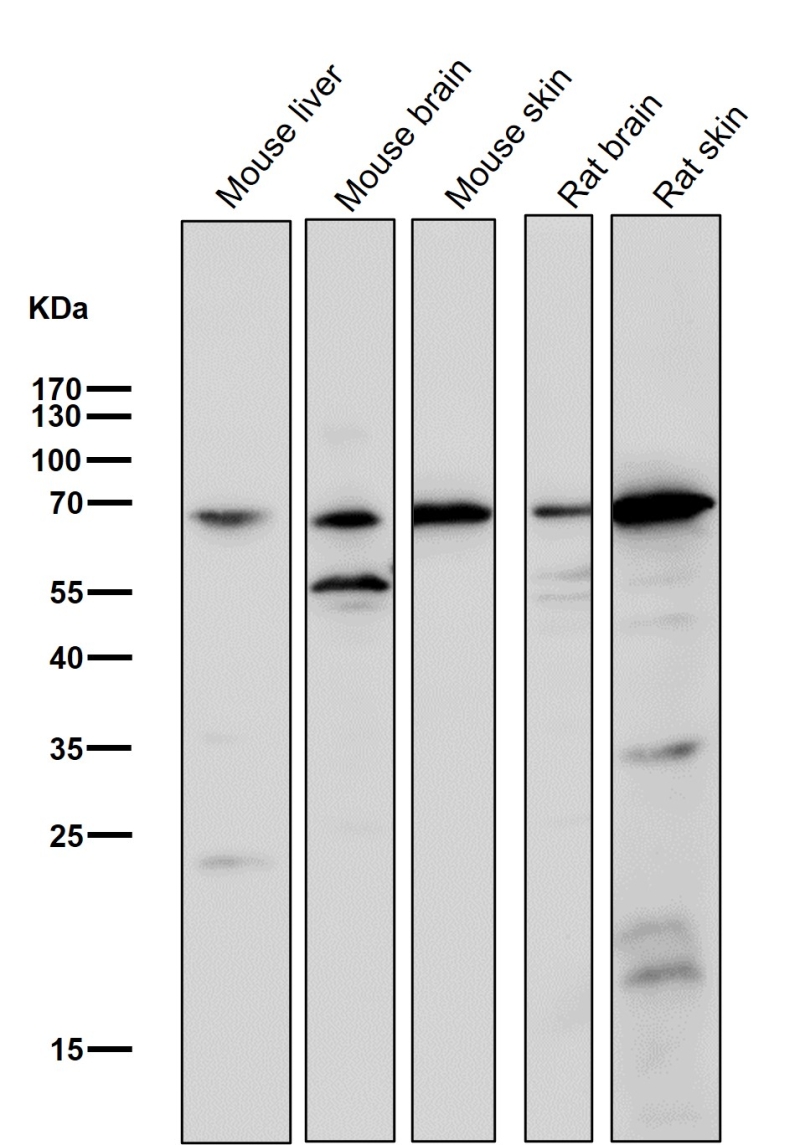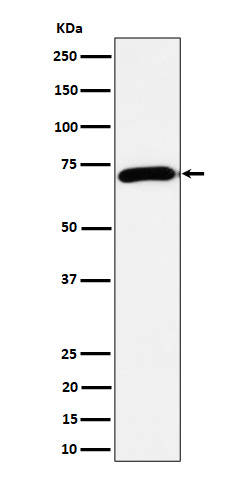

| WB | 咨询技术 | Mouse,Rat |
| IF | 咨询技术 | Mouse,Rat |
| IHC | 1/100-1/200 | Mouse,Rat |
| ICC | 技术咨询 | Mouse,Rat |
| FCM | 咨询技术 | Mouse,Rat |
| Elisa | 咨询技术 | Mouse,Rat |
| Aliases | Acetyl CoA choline O; ChAT; CHOACTase; Choline acetylase; choline acetyltransferase; Choline O acetyltransferase; Choline O-acetyltransferase; CMS1A; CMS1A2;;Choline O cetyltransferase |
| WB Predicted band size | 72 kDa |
| Host/Isotype | Rabbit IgG |
| Antibody Type | Primary antibody |
| Storage | Store at 4°C short term. Aliquot and store at -20°C long term. Avoid freeze/thaw cycles. |
| Species Reactivity | Mouse,Rat |
| Immunogen | A synthesized peptide derived from mouse Choline O cetyltransferase |
| Formulation | Purified antibody in PBS with 0.05% sodium azide,0.05% BSA and 50% glycerol. |
+ +
以下是3篇关于胆碱乙酰转移酶(Choline Acetyltransferase, ChAT)抗体的参考文献及其摘要概括:
1. **"Production and characterization of anti-ChAT monoclonal antibodies for ChAT immunohistochemistry"**
- 作者:Kása P. et al.
- 摘要:该研究描述了针对ChAT蛋白的单克隆抗体的制备与验证,通过免疫组化在大鼠脑组织中特异性标记胆碱能神经元,证实抗体在纹状体、基底前脑等区域的可靠性。
2. **"Cholinergic dysfunction in Alzheimer's disease: selective reduction of ChAT in the nucleus basalis of Meynert"**
- 作者:Bellucci A. et al.
- 摘要:利用ChAT抗体检测阿尔茨海默病患者脑组织,发现基底核Meynert核区ChAT表达显著降低,提示胆碱能系统退化与认知功能障碍的相关性。
3. **"ChAT-Cre transgenic mouse lines for targeting cholinergic neurons"**
- 作者:Rossi J. et al.
- 摘要:通过ChAT抗体验证转基因小鼠模型中Cre重组酶的表达模式,确认抗体在脊髓运动神经元和自主神经节中的特异性,为胆碱能环路研究提供工具。
4. **"Antibody validation for Western blotting: pitfalls in ChAT detection"**
- 作者:Henderson Z. et al.
- 摘要:评估多种ChAT抗体的Western blot特异性,发现部分抗体存在交叉反应,强调选择高特异性抗体及优化实验条件的重要性。
(注:以上文献名为示例性概括,实际引用需核对具体文献信息。)
Choline acetyltransferase (ChAT) is the enzyme responsible for synthesizing the neurotransmitter acetylcholine (ACh) from choline and acetyl-CoA, a critical process in cholinergic signaling. ChAT antibodies are immunological tools designed to detect and quantify the presence of this enzyme in biological samples. These antibodies are widely used in neuroscience research to identify cholinergic neurons, map their distribution in the central and peripheral nervous systems, and investigate dysregulation in neurological disorders such as Alzheimer’s disease, Parkinson’s disease, and myasthenia gravis.
ChAT antibodies are typically generated in hosts like rabbits or mice using purified recombinant ChAT protein or specific peptide sequences as immunogens. Their specificity is validated through techniques like Western blotting, immunohistochemistry (IHC), and immunofluorescence (IF), often showing reactivity across species (human, mouse, rat). In research, they help visualize cholinergic pathways in brain sections, assess changes in ChAT expression in disease models, or confirm cholinergic phenotypes in cultured cells. Some studies also utilize ChAT antibodies to explore neuroplasticity, aging, or the effects of therapeutics targeting cholinergic systems. Due to the role of ACh in cognitive and motor functions, these antibodies remain vital for understanding cholinergic contributions to both health and disease.
×